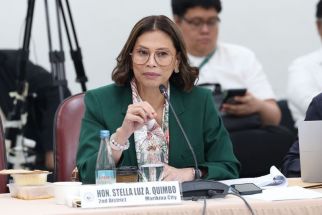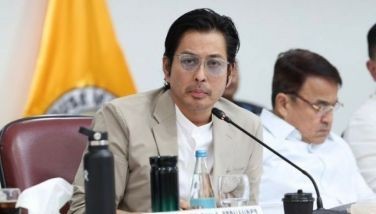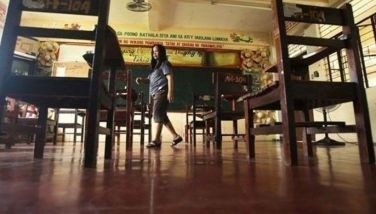Veteran journalist Jose Burgos Jr. laid to rest today
November 22, 2003 | 12:00am
Jose G. Burgos Jr., journalist-farmer and leading symbol of the "alternative press" during the Marcos dictatorship, will be buried at 4:30 p.m. today at The Land farm in San Miguel, Bulacan, where he has lived for more than 15 years and where he now lies in state.
Necrological services and the Requiem Mass will be held at the farm chapel starting at 2 p.m.
Since Monday, masses have been held twice daily at 9 a.m. and 4 p.m. at The Land farm in Barangay Tartaro in San Miguel by Msgr. Ramon Tronqued and Fr. Emmanuel Alparce.
Burgos, declared by the International Press Institute as one of the 50 "World Press Freedom Heroes of the Century" in rites in Boston in year 2000, gave a face and inspiration to various independent and underground publications during martial law, when Ferdinand Marcos closed down all mainstream newspapers and broadcast outlets.
Between April 1977 and the first EDSA Revolt in 1986, Burgos Jr. published a string of publications: WE (for the Young Filipino), renamed later to WE Forum; Ang Pahayagang Malaya, Midday, Tinig ng Masa. In December 1982 the military, acting on orders of the dictator, raided the WE Forum offices, padlocked its small printing plant and hauled off to jail Burgos Jr., his father Jose Burgos Sr., and leading columnists and staffers of the paper.
Despite sedition charges still hanging over his head and those of his co-accused and with the WE Forum offices padlocked, Burgos transformed the then-Filipino language Ang Pahayang Malaya weekly to a national daily newspaper with the help of some two dozen young journalists, and an invisible but massive network of civilian supporters – serving as newspaper dealers, volunteers, informants, suppliers and benefactors, who provided safe houses and other logistics for the guerilla-type operations that suffered from a lack of a printing press, telephone lines, and transportation, among others.
For this feat, Burgos Jr. was named by the InterPress the "International Journalist of the Year" in 1986, an award he received in rites at the United Nations headquarters in New York City.
The IPI tribute, the highest ever bestowed on a Filipino journalist, would come four years later, when IPI officer and fellow journalist Maximo V. Soliven nominated Burgos Jr. to the global millennial search.
The TOYM-award-winning former police reporter was 62 when he died last Sunday, Nov. 16, from complications related to cancer and cardiac ailments. He is survived by wife Edith, five children Peachy, Sonny, Jay, Jay-el and Ann; grandchildren Camille, Miguel, Angel, Jules, Jojo and Therese; mother Tomasa; brothers and sisters Rodolfo, Roberto, Elizabeth, Eduardo, Josefina, Teodoro and Ramon.
Necrological services and the Requiem Mass will be held at the farm chapel starting at 2 p.m.
Since Monday, masses have been held twice daily at 9 a.m. and 4 p.m. at The Land farm in Barangay Tartaro in San Miguel by Msgr. Ramon Tronqued and Fr. Emmanuel Alparce.
Burgos, declared by the International Press Institute as one of the 50 "World Press Freedom Heroes of the Century" in rites in Boston in year 2000, gave a face and inspiration to various independent and underground publications during martial law, when Ferdinand Marcos closed down all mainstream newspapers and broadcast outlets.
Between April 1977 and the first EDSA Revolt in 1986, Burgos Jr. published a string of publications: WE (for the Young Filipino), renamed later to WE Forum; Ang Pahayagang Malaya, Midday, Tinig ng Masa. In December 1982 the military, acting on orders of the dictator, raided the WE Forum offices, padlocked its small printing plant and hauled off to jail Burgos Jr., his father Jose Burgos Sr., and leading columnists and staffers of the paper.
Despite sedition charges still hanging over his head and those of his co-accused and with the WE Forum offices padlocked, Burgos transformed the then-Filipino language Ang Pahayang Malaya weekly to a national daily newspaper with the help of some two dozen young journalists, and an invisible but massive network of civilian supporters – serving as newspaper dealers, volunteers, informants, suppliers and benefactors, who provided safe houses and other logistics for the guerilla-type operations that suffered from a lack of a printing press, telephone lines, and transportation, among others.
For this feat, Burgos Jr. was named by the InterPress the "International Journalist of the Year" in 1986, an award he received in rites at the United Nations headquarters in New York City.
The IPI tribute, the highest ever bestowed on a Filipino journalist, would come four years later, when IPI officer and fellow journalist Maximo V. Soliven nominated Burgos Jr. to the global millennial search.
The TOYM-award-winning former police reporter was 62 when he died last Sunday, Nov. 16, from complications related to cancer and cardiac ailments. He is survived by wife Edith, five children Peachy, Sonny, Jay, Jay-el and Ann; grandchildren Camille, Miguel, Angel, Jules, Jojo and Therese; mother Tomasa; brothers and sisters Rodolfo, Roberto, Elizabeth, Eduardo, Josefina, Teodoro and Ramon.
BrandSpace Articles
<
>
- Latest
- Trending
Trending
Latest
Trending
Latest
Recommended





























